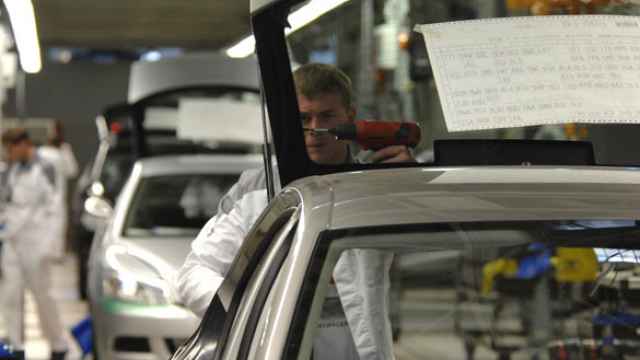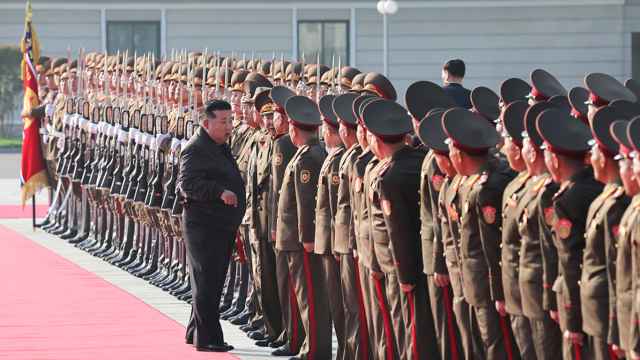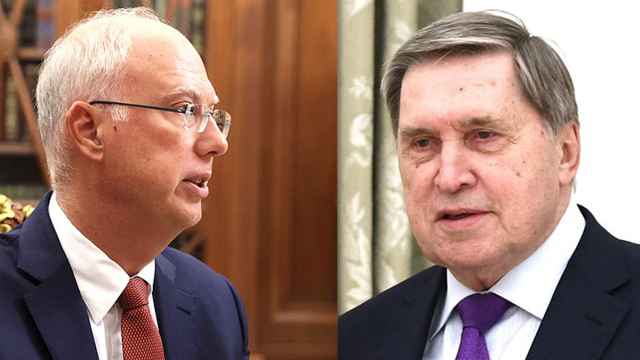BERLIN — Opel Group, the European arm of General Motors, is cutting production and shedding about 500 jobs in Russia, hit by the weak Russian ruble and a plunge in local demand due to a slowing economy and Western sanctions.
Opel said Tuesday it would cut production at its plant in St. Petersburg where it builds the Opel Astra and Chevrolet Cruze compact models, to one shift per day from two.
It will also offer voluntary severance packages to about a quarter of the plant's 2,000 staff and accelerate a move to use more local suppliers — a shift that will help it to cope with a weakening Russian ruble.
The ruble is this year's biggest-declining major emerging currency, having lost more than 15 percent in value to hit a new low against the U.S. dollar on Tuesday.
Western sanctions against Russia over the crisis in Ukraine are causing further strains to carmakers.
"Demand has been in free fall recently, none of the carmakers producing in Russia will be able to escape output cuts," said Tatyana Hristova, analyst at market research firm IHS Automotive.
Production of passenger cars and commercial vehicles may slump 14 percent this year to 2.4 million autos, declining a further 6.5 percent in 2015 to 2.24 million before rebounding in 2016, Hristova forecast.
Staff Changes
Restructuring at Opel will also involve changes in senior personnel. Susanna Webber, head of purchasing and logistics, will take the helm of Opel's Russian operations with immediate effect, to be assisted by new vice president Andy Dunstan, who was previously the carmaker's managing director in the country.
Opel, which sells the Opel, Chevrolet and Cadillac brands in Russia, has seen its market share in Russia fall to 7.8 percent in the first eight months of the year, down from 9 percent in the January-August period a year ago.
"Russia was our third-biggest market last year after Britain and Germany," Opel chief executive Karl-Thomas Neumann said. "At the moment, this market is locked into severe turbulences."
Opel is sticking to its target of reaching profitability in Europe by mid-decade, a spokesman for the automaker said.
"We believe in the long-term potential of Russia but volume and prices are under strong pressure and the ruble keeps devaluing. We're now taking steps to minimize the risk and stay on course," Neumann said.
Going forward, Opel said it aimed to raise the proportion of locally-sourced components to 60 percent to wean itself off a dependence on parts imported from the euro zone. Opel declined to comment on the current level of locally produced car parts.
Opel will invest in a new press and body shop in the Samara region so it can stamp body panels and assemble them locally.
Still, Opel's planned investments in parent GM's joint venture with Russia's top automaker AvtoVAZ will not be affected by the changes, Neumann said.
AvtoVAZ said last month it would cut production of its Lada cars by 25,000 vehicles between September and November, though workers would continue to get their full salary.
Volkswagen, Europe's largest automotive group, said earlier this month it would suspend production at its Kaluga factory in Russia for 10 days from Sept. 8, while keeping to longer-term expansion plans.
A Message from The Moscow Times:
Dear readers,
We are facing unprecedented challenges. Russia's Prosecutor General's Office has designated The Moscow Times as an "undesirable" organization, criminalizing our work and putting our staff at risk of prosecution. This follows our earlier unjust labeling as a "foreign agent."
These actions are direct attempts to silence independent journalism in Russia. The authorities claim our work "discredits the decisions of the Russian leadership." We see things differently: we strive to provide accurate, unbiased reporting on Russia.
We, the journalists of The Moscow Times, refuse to be silenced. But to continue our work, we need your help.
Your support, no matter how small, makes a world of difference. If you can, please support us monthly starting from just $2. It's quick to set up, and every contribution makes a significant impact.
By supporting The Moscow Times, you're defending open, independent journalism in the face of repression. Thank you for standing with us.
Remind me later.






